Alyssa Coluccio always loved reading and writing, but when she became a mom those passions fell to the back burner until last year when she started her book blog, Reclaim the Page. The book community on Instagram inspired Alyssa to launch a DCC Awareness Day fundraiser in honor of her daughter, Ari, that resulted in images of blue and white stacks of books with information on disorders of the corpus callosum shared to thousands of people this summer (in addition to generous donations!). Read our interview with Alyssa on her life, family and how her blog helped connect Alyssa during a time that when she needed community the most.
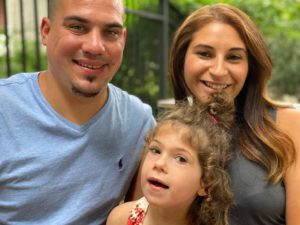 Q: Tell us a little bit about you and your family.
Q: Tell us a little bit about you and your family.
We’re your pretty typical American family. My husband, Jesse, is an HR manager for the New York State Department of Transportation and I am a High School English teacher. Arianna, who we call Ari, is six. She’s an only child, but she is excited to be welcoming a Bernedoodle into our family in the coming months! Right now we live in Albany, NY. As a family, we love to cook big meals, watch football on Sundays, go swimming in the summer, visit with family and friends, and travel.
Q: Your daughter, Ari, has agenesis of the corpus callosum. Will you share your diagnosis journey and how you learned about her condition?
We actually learned Ari’s diagnosis in-utero. I was about 30-weeks pregnant when my OBGYN found a concerning marker on one of my ultrasounds. To be honest, this part of our journey was a blur. I was in my last semester of grad school at the time, I had experienced a very healthy, normal pregnancy, and seemingly out of nowhere we were being told our child would be born severely disabled, if she lived at all. My pregnancy was moved to high-risk and I began a process of tests, fetal MRI’s, meetings with specialists, and weekly OBGYN visits. At about 32 weeks we had testing done that confirmed Ari was missing her corpus callosum and she was given the official diagnosis of Agenesis of the Corpus Callosum. Our doctors told us to expect the worst in terms of her prognosis.
The day Ari was born, we had no idea what to expect. Thankfully, she came out kicking and screaming, and never had to spend any time in the NICU. We were lucky to have had a diagnosis before birth, because as soon as we left the hospital and had her first pediatrics appointment, we started advocating for her to receive Early Intervention. Her pediatrician was not terribly concerned as she was still a newborn, but we wanted to make sure she was given every opportunity for success as early as possible. We began physical therapy at 6 months, followed by occupational therapy at around 12 months, and finally speech at around 18 months.
Aside from her developmental delays, Ari was extremely healthy the first two years. The day after her second birthday, she began having seizures. Her seizures were awful in the beginning. She was not able to come out of them on her own and she would have difficulty breathing. She would ultimately end up having to be intubated and would be placed in the PICU for several days until she was finally seizure free. This went on for about two years until her neurologist at the time finally found a combination of medications that worked for her. She takes two seizure meds three times a day, and they have been life changing. She is now almost entirely seizure free, and the seizures she does have can be treated at home.
In the midst of these seizures, our neurologist also nominated our family for a medical grant through Columbia University to get extensive bio-genome sequencing done. This procedure determined Ari’s primary syndrome, which is so rare it is named after the gene she is missing – PPP2R1A. Side effects of this syndrome include Agenesis of the Corpus Callosum, Epilepsy, Intellectual Disability, as well as physical and cognitive delays.
The first four years of Ari’s life were incredibly trying, but we were so lucky to have definitive diagnoses so early on. It truly allowed us to understand how to best advocate for Ari and how to fight for her care in all facets of life. Understanding her neurological needs early on has allowed us to provide her with the best medical treatment available, and that was truly the first step in ensuring her quality of life. Education was the next great hurdle, and I’m sure it will be ongoing. We had horrific experiences with daycare, but we ultimately fought hard for an incredible Pre-K placement which changed ours and Ari’s life. This past year she started Kindergarten and was placed in an amazing 12-1-4 program in a mainstream Elementary school, which is everything we could have hoped for. She adores her teachers, receives daily therapies (PT, OT, Speech, and even Music Therapy) and is now thriving in school.
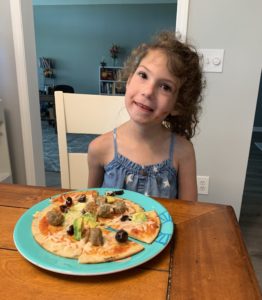 Q: Tell us about Ari, her interests, and what life is like for her?
Q: Tell us about Ari, her interests, and what life is like for her?
I always say that Ari is the loudest non-verbal child I’ve ever known! I have truly never met a more confident, social, and genuinely happy child. She loves absolutely everyone she meets, and if people don’t love her back, she can’t be bothered with them. She genuinely can’t believe someone wouldn’t want to hang out with her! Ari’s favorite thing to do is spend time with our family and friends. She is the life of the party and her ideal situation is being in the middle of a big room, with all of her favorite people, going from person to person giving hugs and kisses. Ari loves music, and she is always singing and dancing. Her new favorite musician is J Cooper and she listens to his YouTube channel obsessively! Ari also loves to eat. We come from a big Italian family, so she is the most happy when she is in the kitchen with her Gigi or helping me cook dinner. Sundays are her favorite because she gets her favorite meal- pasta and homemade sauce. Sundays in the Fall are even better because she gets her favorite meal after watching her favorite team, the Jets, with her Daddy.
Ari lives her life to the fullest. She wakes up very excited to go to school, her teachers report that she loves participating in class, and she comes home every day in a great mood. When the weather is nice, her favorite thing to do when she comes home is go swimming, swing on her swing set, and blow bubbles. She enjoys dinner and bath time, and then likes to cuddle on the couch in the evenings watching her favorite TV show, Vampirina. Despite all of her obstacles, I think if Ari could talk, she would tell you she loves her life.
Q: You have a book blog called Reclaim the Page on Instagram. For the people who don’t know what a bookstagrammer is – will you explain it and share what led you to start your blog on social media?
 A bookstagrammer is a person who uses their Instagram page to share their love of reading, writing, and bookish lifestyle. Just as people create Influencer accounts for food and fashion, Bookstagrammers do the same for all things related to books. I lurked on Bookstagram for a while before gaining the confidence to make my own account. I was honestly becoming depressed by my personal Instagram account. It was very hard for me to scroll my newsfeed and see pictures and videos of other people’s neuro-typical children and what seemed like a much easier life and experience with parenting. I loved the idea of being a part of a social community where I could scroll through and just see people’s stacks of books, read their book reviews, see pictures of beautiful coffee shops and bookstores, etc. It was therapeutic. I had always loved reading and writing, and it was something that I lost when I became a mom. Ari’s needs were so intense for so long that I didn’t have the time to read or write. This year was the first year of her life that I felt I could finally take some time to have a hobby again, and without even realizing it, Reclaim the Page ended up becoming a way for me to reclaim the person I was before I became a mom.
A bookstagrammer is a person who uses their Instagram page to share their love of reading, writing, and bookish lifestyle. Just as people create Influencer accounts for food and fashion, Bookstagrammers do the same for all things related to books. I lurked on Bookstagram for a while before gaining the confidence to make my own account. I was honestly becoming depressed by my personal Instagram account. It was very hard for me to scroll my newsfeed and see pictures and videos of other people’s neuro-typical children and what seemed like a much easier life and experience with parenting. I loved the idea of being a part of a social community where I could scroll through and just see people’s stacks of books, read their book reviews, see pictures of beautiful coffee shops and bookstores, etc. It was therapeutic. I had always loved reading and writing, and it was something that I lost when I became a mom. Ari’s needs were so intense for so long that I didn’t have the time to read or write. This year was the first year of her life that I felt I could finally take some time to have a hobby again, and without even realizing it, Reclaim the Page ended up becoming a way for me to reclaim the person I was before I became a mom.
Q: Bookstragrammers spend a lot of time reading and reviewing books before they are available to the public, chatting with authors, taking beautiful images of books and book stacks (books stacked for a photo), and more. Can you share what you focus on with your Instagram page and the work that goes into it?
 Intersectional Feminism has always been important to me and has become increasingly more important to me the past several years, as I grew as both an individual and a woman. When I began my page, I wanted it to have a large emphasis on work by women and women identifying writers, as well as an emphasis on the work of women from underrepresented communities and other countries. I do read and review books by men, but I’d say my content is 90% focused on women writers. I also gravitate towards literary fiction and horror books, so this tends to be the genre I read and review. The page is also only 9 months old, and is still a work in progress, but I anticipate amplifying the voices of women writers through an Intersectional lens will always be its core focus.
Intersectional Feminism has always been important to me and has become increasingly more important to me the past several years, as I grew as both an individual and a woman. When I began my page, I wanted it to have a large emphasis on work by women and women identifying writers, as well as an emphasis on the work of women from underrepresented communities and other countries. I do read and review books by men, but I’d say my content is 90% focused on women writers. I also gravitate towards literary fiction and horror books, so this tends to be the genre I read and review. The page is also only 9 months old, and is still a work in progress, but I anticipate amplifying the voices of women writers through an Intersectional lens will always be its core focus.
Bookstagramming can be as easy or intense as you make it. I run my account like a bookish lifestyle blog, so I’d say when I am truly putting effort into it, it feels like a part-time job. I’m a fast reader, and I’ve found ways to incorporate reading into my everyday life, so getting through books isn’t the most time consuming aspect, honestly. Creating content, coming up with photo concepts, taking photos, engaging with other accounts, posting every other day, developing campaigns and collaborations, and hosting giveaways is where I sometimes struggle to keep up!
Q: For DCC Awareness Day, you created a fundraiser on Instagram using the hashtag Stacks for Ari. For every blue and white stack of books that other bookstagrammers posted using #StacksforAri, you donated $1 to the NODCC (up to $100). This was such a creative fundraiser so will you share what inspired it and the results?
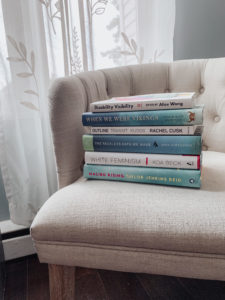 As I’ve come to understand the Bookstagram community more, I’ve started participating in other people’s Stacks For a Cause initiatives. This is a hashtag that inspires others to create fundraising incentives for a cause that is important to them. My friend Gema (@thrillerswithgems) hosted a fundraiser in May for Mental Health Awareness Month, and it inspired me to consider doing something similar for NODCC.
As I’ve come to understand the Bookstagram community more, I’ve started participating in other people’s Stacks For a Cause initiatives. This is a hashtag that inspires others to create fundraising incentives for a cause that is important to them. My friend Gema (@thrillerswithgems) hosted a fundraiser in May for Mental Health Awareness Month, and it inspired me to consider doing something similar for NODCC.
When I found out that DCC Awareness Day fell within the same month as Disability Pride Month, I thought it would be the perfect time to launch the initiative. I decided to choose the blue and white theme because it was closest to NODCC’s blue and silver logo colors. (Tough to find silver books!)
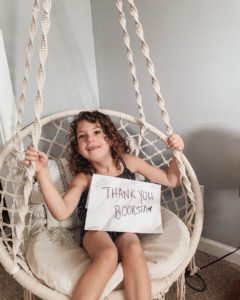
 I was completely amazed at the response #stacksforari received! I set my initial goal at a $100 max because I thought I’d be lucky to get even 50 people to participate. Throughout July, countless people shared the original post, commented on it with words of support, created stacks of their own, asked to donate directly to the website, and tagged their friends and family to participate in the stacks challenge.
I was completely amazed at the response #stacksforari received! I set my initial goal at a $100 max because I thought I’d be lucky to get even 50 people to participate. Throughout July, countless people shared the original post, commented on it with words of support, created stacks of their own, asked to donate directly to the website, and tagged their friends and family to participate in the stacks challenge.
I ultimately ended up choosing to honor every post that was made, which totaled $140. I then had several family members and friends volunteer to match my donation. As of this morning (8/10) we have raised $720 – and that’s just the donations I know about! It’s a testament to the incredible empathy and humanitarianism within the Bookstagram community, as well as the incredible sense of support and community I’ve been lucky to find from the people within it.
Q: How has your blog and sharing about Ari helped you personally?
I was honestly very lonely for a long time. I have wonderful friends and family, but being the mother to a child with disabilities can feel very isolating. In addition to being young when we had Ari, we also had a child that made socializing difficult. We were always having to cancel plans because Ari had a seizure, or a meltdown, or was up all night and left us too exhausted to follow through. We lost friends and I struggled to make new ones. I found the community of Moms available to me to be less than welcoming. Ari was never invited on playdates or to birthday parties, and we were more or less shunned by many of the families at daycare early on. It truly made me hate motherhood as a community, and given how many women my age were still living the single life, I felt like there wasn’t a place for me anywhere.
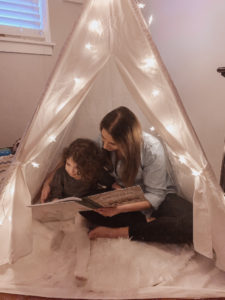 Creating my blog has provided me with a flexible sense of socialization and community. I’ve met so many amazing women from all over the world who I have become genuine friends with. I never meant to talk about Ari in this space, but as I began to open up to the community more and find support within it, it came naturally to discuss my personal life.
Creating my blog has provided me with a flexible sense of socialization and community. I’ve met so many amazing women from all over the world who I have become genuine friends with. I never meant to talk about Ari in this space, but as I began to open up to the community more and find support within it, it came naturally to discuss my personal life.
Ari is obviously one of- if not THE most- important aspect of that. As I opened up more about Ari’s life and our experiences, I found an even greater sense of support. Many people messaged me thanking me for the posts and sharing their own stories of struggles with motherhood and parenting children with special needs. I even met another mom whose daughter has agenesis through the campaign! It’s been an extremely therapeutic experience.
You want the entire world for your child, and when your child struggles and their hardships are out of your control, there is a lot of anger and resentment that follows. I didn’t want “disability” to come with a negative connotation, because I love Ari for exactly who she is, and that includes her disability. Still, it’s hard. The guilt I often felt holding those two feelings was immense. Sharing our story, raising awareness, and showing the world what beautiful and full lives people with disabilities can lead has given me a sense of control in a situation I never had control in. It’s allowed me to find the light in what was initially a very bleak situation, and I think it’s made me an all-around better mom and human being.
You can follow along with Alyssa on Instagram at @reclaimthepage. To see the beautiful book stacks and the results of Alyssa’s fundraiser, search #stacksforari on Instagram.

